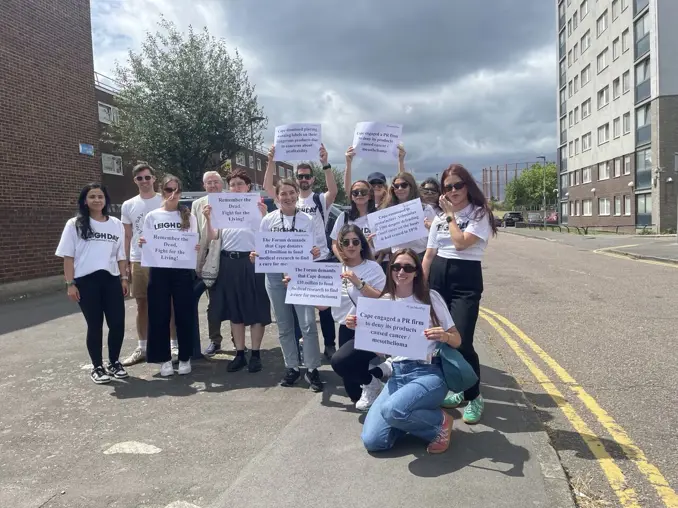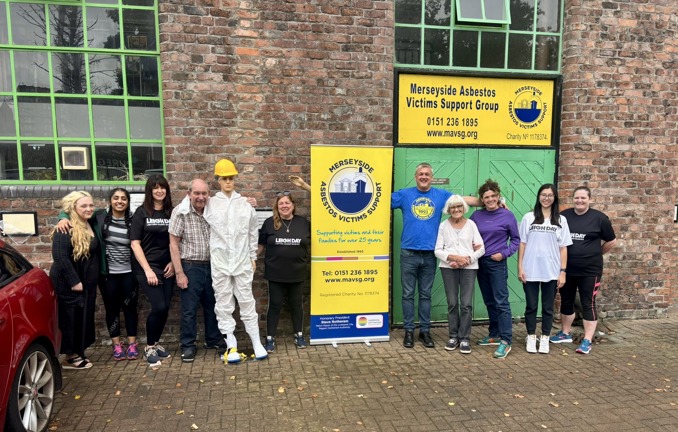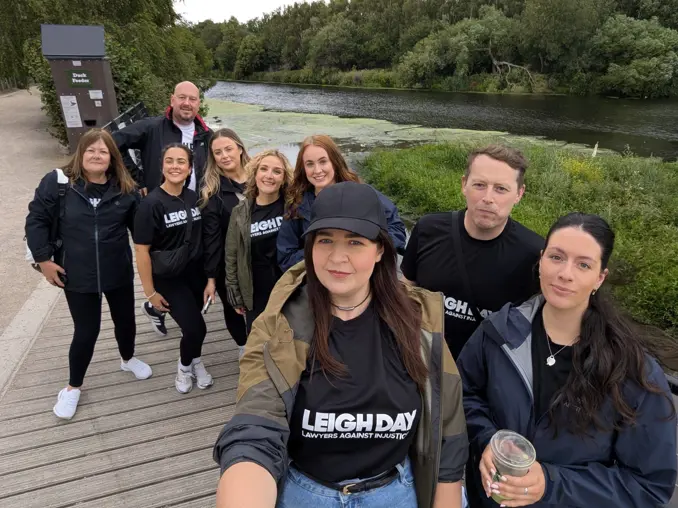
Leigh Day asbestos team take on fundraising walks
Throughout June and July, the asbestos team at Leigh Day completed a series of charity walks across the country in areas impacted by asbestos diseases.
Posted on 12 August 2025
The law firm represents hundreds of people across the UK who have suffered as a result of asbestos related diseases, which can often be terminal.
Some areas where the material was used in abundance in factories, warehouses and other buildings have been especially impacted by these diseases. In these towns and cities, a large amount of the working population would have been exposed to asbestos in the mid to late 20th century.
Asbestos support groups provide vital assistance to these communities, with services such as counselling, information and signposting for compensation claims.
The asbestos team at Leigh Day works closely with many of the countries’ support groups, which are often important points of connection to workers impacted by asbestos related diseases and their families.
To raise funds and awareness for these charities, Leigh Day lawyers took part in a number of walks around England, meeting with support groups along the way.
Plymouth
On 24 June, lawyers from the firm’s asbestos team met in Plymouth to complete a 6.5 mile circular walk around the city centre and through the dockyards, where many former workers were exposed to asbestos.
The walk was in aid of South West Asbestos Support and Awareness Group (SWASAG), which operates across Devon and Cornwall supporting people who have been diagnosed with asbestos illnesses.
The legal team’s route took them past Devonport Royal Dockyard, a naval base which once employed almost 20,000 people. Throughout the 1950s, 60s and 70s, asbestos was used prolifically onboard ships which were being refitted at the dockyard.
The effects of this are still being seen today, with new cases of asbestos diseases still being diagnosed and Plymouth recognised as a hotspot for such illnesses.
After completing the walk route, the legal team met with members of SWASAG to commemorate the day and the vital work of the group.

East London
Leigh Day asbestos lawyers visited a former Cape asbestos factory site in Barking, East London, on 26 June to honour those who have lost their lives as a result of asbestos exposure and raise funds for asbestos support groups.
The factory operated at the heart of the community in Barking and is understood to have exposed hundreds and probably thousands of workers and residents to asbestos fibres, resulting in many people losing their lives.
The team then travelled along the river, past the various London docks and the heavy industry of Silvertown. They then walked along the Thames Path from Canary Wharf through the old dockland areas of Limehouse and Wapping.
Asbestos was imported into the UK via the London docks, where it was used throughout the south of England. Its impact stretches across many industries, and even to the families of people who worked in asbestos heavy environments who have experienced secondary exposure from living near factories or coming into contact with dust on workers’ clothes.
The asbestos team at Leigh Day were walking to highlight the important work done by the London Asbestos Support Awareness Group, which offers to support to people affected by asbestos related diseases throughout London and the South East.

Liverpool/Runcorn
On 15 July, the Leigh Day asbestos team walked through Runcorn and Liverpool to raise awareness of mesothelioma and asbestos diseases, and to highlight the amazing work done by asbestos support groups around the country.
The walk symbolised the passage of asbestos into Liverpool Docks, its transportation along the waterways of Merseyside and Cheshire, and its processing, manufacture and use in various locations across the region.
These include the Everite plant in Widnes, where asbestos products were made, and factory sites such as ICI, Shell Stanlow, Fiddlers Ferry Power Station, and many others where asbestos materials were extensively used. Sites such as these have resulted in many individuals developing mesothelioma caused by asbestos exposure.
The Runcorn leg of the walk started on Mersey Road in Dukesfield, and went along the Mersey/Manchester Ship Canal. The team then arrived at Wigg Island, where the site of the former ICI Wigg Works East chemical factory has been reclaimed and turned into a nature reserve and community park.
The Liverpool leg of the walk began in the afternoon, starting at the Britannia Inn by the banks of the River Mersey. The team walked to the Liver Buildings passing a number of the former dockyards along the way including Brunswick Dock, Coburg Dock, Queens Dock, Wapping Dock and the Albert Dock.
Asbestos exposure occurred at these docks through the loading and unloading of raw asbestos and asbestos goods in the docks, and from ship repair yards where men were exposed to the deadly material while carrying out work on board vessels undergoing repair.
The team then passed the start of the Leeds and Liverpool canal where many tons of asbestos, arriving into Liverpool from South Africa and Canada, were shipped to asbestos factories in Manchester and Leeds run by Turner & Newall and Cape.
The walk was completed alongside members of the charities Merseyside Asbestos Victims Support Group, and Cheshire Asbestos Victims Support Group, who provide vital support to people in the area who have suffered as a result of asbestos related diseases.

Leeds/Manchester
While the Liverpool and Runcorn walks took place, more members of Leigh Day’s asbestos teams across the North and Midlands gathered for another fundraising walk to support those affected by asbestos related diseases.
Teams from Manchester and Chesterfield met in Leeds and set off along the docks, joined by a representative of the Yorkshire and Humberside Asbestos Support Group (SARAG).
The group passed Thwaites Watermill to the south of the city, and travelled roughly 10km along the Trans Pennine Trail before travelling via train to Manchester.
In Manchester, the team were joined by the Greater Manchester Asbestos Victims Support Group (GMAVSG), and the walk continued along the canals to New Islington Marina.
The walk was completed to raise awareness and show the firm's solidarity with all those impacted by the catastrophic effects of asbestos exposure, as well as honouring and highlighting the important work of support groups across the UK.

Mesothelioma And Me
"Mesothelioma And Me” is a powerful campaign dedicated to spotlighting the devastating dangers of asbestos and the profound impact mesothelioma has on individuals and their families. Through this compelling film series, our clients share deeply personal, heartfelt stories, offering raw and honest insights into their journeys living with mesothelioma.





